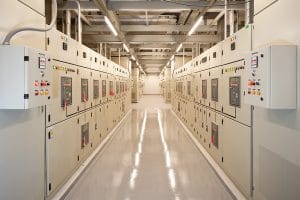 Properly cooling high-performance electrical enclosures (like control cabinets, and more) has long been the prominent goal of modern heat exchangers. For example, in industries where companies rely on technology of any size, the efficiency of their electrical cooling systems can play a significant role in the company’s overall success. Heat exchangers help ensure it’s a positive role by providing an efficient and easily manageable way to prevent electrical systems from overheating. Although heat exchangers have evolved far beyond just enclosure cooling, it still remains one of the most important and beneficial aspects of advanced heat exchanger technology.
Properly cooling high-performance electrical enclosures (like control cabinets, and more) has long been the prominent goal of modern heat exchangers. For example, in industries where companies rely on technology of any size, the efficiency of their electrical cooling systems can play a significant role in the company’s overall success. Heat exchangers help ensure it’s a positive role by providing an efficient and easily manageable way to prevent electrical systems from overheating. Although heat exchangers have evolved far beyond just enclosure cooling, it still remains one of the most important and beneficial aspects of advanced heat exchanger technology.
Making thermal management more efficient
The way heat exchangers cool electrical enclosures and other systems is different than traditional cooling solutions. For example, rather than working to cool the temperatures inside of the enclosure, heat exchangers prevent the temperature from rising at all by constantly absorbing and transferring waste heat before it has a chance to accumulate. This consistent, looped heat transfer process is the basis for the many different benefits that heat exchangers provide, including the enhanced efficiency of electrical cooling when compared to more conventional solutions. Without having to rely on generating and circulating chilled air to combat electrical waste heat, heat exchangers can perform much more efficiently and reliably, and for much longer.
Cooling enclosures in more demanding situations
The boosted efficiency and reduced overall costs (including energy and maintenance) that heat exchangers provide have been vital for many modern operations. However, for applications that operate in hazardous and extreme conditions, the typical heat exchanger may not be sufficient to provide optimal cooling and still remain functional. For instance, in oil and gas manufacturing, operations are often conducted under extremely hazardous conditions, and specialized heat exchangers are able to provide optimal cooling while also maintaining optimal safety. This not only makes operations more efficient, but also helps companies adhere to strict NEMA enclosure regulations for applications that include exposure to hazardous elements.
Thermal solutions that go beyond enclosure cooling
As heat exchangers (both conventional and specialized) have become an increasingly more important part of modern operations, companies have continued to find even more advantages to the eco-friendly cooling technology. By utilizing a heat exchanger’s heat transfer capabilities, companies can use custom solutions for purposes that go beyond enclosure cooling, such as providing heat at minimal cost for processes such as wastewater treatment and more. Utilizing electrical waste heat for other purposes instead of just dissipating it helps companies significantly lower their energy costs in other areas outside of enclosure cooling.
For more information about the advancement of electrical enclosure cooling, call Noren Thermal Solutions in Taylor, TX, at 866-936-6736.







